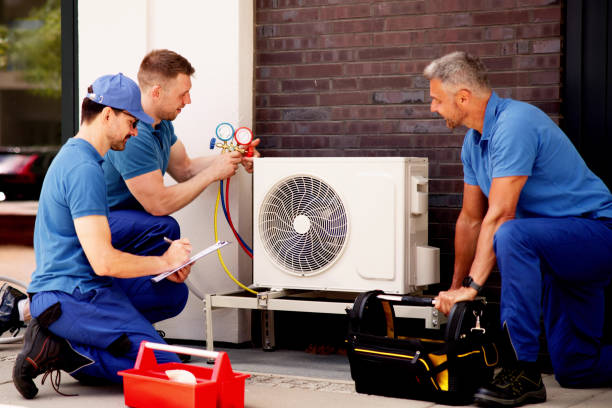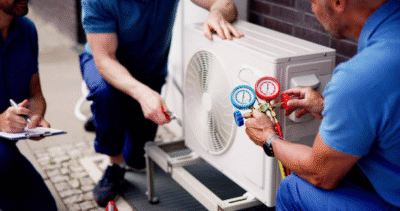Introduction to HVAC Installation in Northern Virginia
Choosing the right HVAC system is a critical decision for property owners and builders in Northern Virginia. At Arminco Air(AAI), we understand that a well designed HVAC system ensures comfort, energy efficiency, and long term savings. Northern Virginia’s unique climate, with hot, humid summers and chilly winters, demands a system that can handle diverse conditions while meeting your building’s specific needs. This article will guide you through the process of selecting the ideal HVAC system, covering types, sizing, costs, and how to find a trustworthy contractor.
Types of HVAC Systems
Selecting the right HVAC system starts with understanding the options available. Different buildings require different solutions based on size, layout, and usage.
Residential vs. Commercial HVAC Systems
Residential and commercial HVAC systems serve distinct purposes. Residential systems are designed for homes, focusing on comfort for smaller spaces. Commercial systems, however, are built for larger buildings like offices or retail spaces, prioritizing durability and efficiency for high occupancy.
- Residential: Ideal for single family homes or small apartments, offering simpler installation.
- Commercial: Suited for larger spaces, requiring robust systems to handle higher demand.
Common HVAC Options
There are several HVAC system types to consider, each with unique benefits:
- Split Systems: Separate indoor and outdoor units, common in homes for their efficiency.
- Packaged Units: All components in one unit, ideal for buildings with limited indoor space.
- Ductless Systems: Flexible for spaces without ductwork, offering targeted heating and cooling.
Factors for HVAC Sizing and Selection
Proper sizing and selection are essential for an HVAC system to perform effectively. An undersized system will struggle to maintain comfort, while an oversized one can waste energy and increase costs.
Calculating Proper HVAC Sizing
HVAC sizing depends on your building’s square footage, insulation, and occupancy. A professional load calculation, often using the Manual J method, ensures the system matches your needs. For example, a small office may need a 3 ton unit, while a large commercial space could require 10 tons or more.
- Square Footage: Larger spaces need higher capacity systems.
- Insulation Quality: Poor insulation may require a more powerful unit.
Energy Efficient HVAC Benefits
Energy efficient HVAC systems reduce utility bills and environmental impact. Look for systems with high SEER (Seasonal Energy Efficiency Ratio) ratings, ideally 14 or above, to maximize savings. Energy efficient units may also qualify for rebates or tax incentives, making them a smart long term investment.
- Lower Bills: Efficient systems use less energy, reducing monthly costs.
- Eco Friendly: Reduced energy consumption lowers your carbon footprint.
Ductwork Installation Essentials
Ductwork is the backbone of many HVAC systems, delivering air throughout your building. Poorly designed or installed ductwork can lead to uneven temperatures and energy loss. Ensure ducts are properly sealed and insulated, especially in unconditioned spaces like attics.
- Material Quality: Use durable materials to prevent leaks.
- Professional Installation: Expert design ensures optimal airflow.
Understanding HVAC Installation and Replacement Costs
Cost is a major consideration when choosing an HVAC system. Understanding the factors that influence pricing helps you budget effectively.
Factors Influencing HVAC Replacement Cost
HVAC replacement costs vary based on system type, size, and labor. A residential split system might cost between $3,000 and $7,000, while commercial systems can range from $10,000 to $50,000 or more. Additional factors include:
- System Size: Larger systems are more expensive.
- Installation Complexity: Custom ductwork or retrofitting increases costs.
Budgeting for Commercial HVAC Installation
Commercial HVAC installation in Northern Virginia requires careful planning. Larger systems and complex ductwork often lead to higher costs. Budget for both upfront installation and long term maintenance to ensure system longevity. Request detailed quotes from contractors to compare costs and services.
HVAC Challenges in Northern Virginia
Northern Virginia’s climate and regulations present unique challenges for HVAC systems. Understanding these factors helps you choose a system that performs reliably.
Navigating Seasonal Weather Variations
Northern Virginia experiences hot, humid summers and cold winters, requiring HVAC systems that can handle both extremes. A system with strong dehumidification is essential for summer comfort, while powerful heating is needed for winter. Variable speed systems can adapt to changing conditions, maintaining consistent comfort.
Compliance with Local Regulations
Virginia building codes require HVAC systems to meet specific efficiency and safety standards. For example, new installations must comply with energy codes like the Virginia Uniform Statewide Building Code. A knowledgeable contractor will ensure your system meets all requirements, avoiding costly fines or delays.
Choosing a Reliable HVAC Contractor Near Me
A reliable contractor is key to a successful HVAC installation. The right professional will guide you through the process, from system selection to maintenance.
Qualities of a Trusted Contractor
Look for contractors with experience, proper licensing, and positive customer reviews. They should offer transparent pricing and clear communication. A good contractor will also provide maintenance plans to keep your system running smoothly.
- Certifications: Ensure they are licensed and insured.
- Reputation: Check online reviews and ask for references.
Key Questions to Ask
Before hiring a contractor, ask questions to ensure they meet your needs:
- What system types do you recommend for my building?
- Can you provide a detailed cost breakdown?
- How long will the installation take?
Conclusion
Choosing the right HVAC system for your Northern Virginia building requires careful consideration of system types, sizing, energy efficiency, and costs. By understanding your building’s needs and the local climate, you can select a system that provides comfort and savings for years to come. Partnering with a trusted contractor like Arminco Air ensures a smooth installation process and reliable performance. For personalized guidance, contact AAI.
FAQ’s
What is the typical cost of HVAC installation in Northern Virginia?
The cost varies based on system type and building size. Residential installations typically range from $3,000 to $7,000, while commercial projects can cost $10,000 to $50,000 or more.
How can I tell if my building needs an energy efficient HVAC upgrade?
If your utility bills are high or your system struggles to maintain consistent temperatures, an energy efficient upgrade may be beneficial. A professional assessment can confirm this.
What are the main differences between residential and commercial HVAC systems?
Residential systems are designed for smaller spaces and simpler needs, while commercial systems handle larger buildings with higher occupancy and more complex requirements.
How long does ductwork installation usually take?
Ductwork installation typically takes 1 to 3 days for residential projects and up to a week for larger commercial installations, depending on complexity.
When is HVAC replacement a better option than repairs?
Replacement is often better if your system is over 10 to 15 years old, requires frequent repairs, or can no longer maintain consistent comfort.



